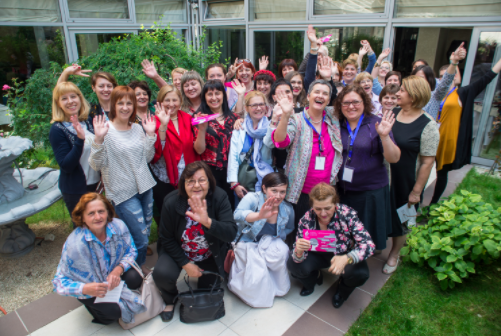An Analysis of Chapter Fourteen of the Global Study: Guidelines and Recommendations
By Alexandra Rojas
Participants of a solidarity dialogue between women activists from Bosnia and Herzegovina and Ukraine held in Sarajevo on 7-9 June 2016 convened by WILPF and The Kvinna Till Kvinna Foundation (Photo: WILPF)
The UNSCR 1325 Global Study on Women, Peace and Security calls on the United Nations, Member States, civil society and all actors to ground their understanding of conflict within the needs and concerns of women in specific situations of conflict. It also highlights persistent problems, such as the prevalence of militarisation, underrepresentation of women in official peace negotiations and perennial lack of funding for the Women, Peace and Security (WPS) Agenda.
Chapter 14 of the UNSCR 1325 Global Study summarises the main recommendations for action, which include the need to strengthen conflict prevention and demilitarisation efforts. Some of these recommendations have already contributed to a process of UN reform that is beginning to pivot away from crisis response and toward conflict prevention through the “sustaining peace” agenda, illustrating the importance of the Integrated Approach. However, there is a lot more work to be done!
Facts and Figures
Women’s participation increases the probability of a peace agreement lasting at least two years by 20 percent, and by 35 percent the probability of a peace agreement lasting 15 years (Global Study on 1325, 41-42);
A review of 47 national action plans on women, peace and security in 2014 showed that only 11 had some allocated budget (Global Study on 1325, 270);
Research shows a consistent, striking disparity between policy commitments to gender equality and women’s empowerment, and the financial allocations to achieve them (Global Study on 1325, 372);
Since 2000 annual military expenditures have increased by approximately 60 per cent, or the equivalent of 2500 years of expenditure by international disarmament and non-proliferation organisations (Global Study on 1325, 134);
- As of 2015 news media stories on peace and security-related themes from 15 conflict and post-conflict countries identified women as victims more than twice as often as men, and portrayed women as leaders only four percent of the time (Global Study on 1325, 293-294).
Recommendations
Member States, the UN and the international community should ensure that all actors, mediators, and parties to the conflict guarantee that women’s participation in talks is equal and meaningful, and barriers to their participation, whether these exist in law or in practice, are completely eliminated (Global Study on 1325, 58);
Member States should provide capacity building and support the development, financing, implementation and monitoring of NAPs in conflict-affected countries (Global Study on 1325, 58);
Member States and the UN should provide financial, technical and political support to countries to encourage educational and leadership training for men, women, boys and girls, which reinforces and supports non-violent, non-militarised expressions of masculinity (Global Study on 1325, 214);
Member States should adopt gender-responsive budgeting practices, including through consultation with civil society, as a strategy to address militarised state budgets and their destabilising impact on international peace and security and women’s rights (Global Study on 1325, 214);
- Member States should commit to doctrines and planning that takes into account the impact on women and girls of every military deployment and operation, and that considers the use of unarmed military protection as a preferable or complementary protection method (Global Study on 1325, 402).
For more information, see UN Women’s Global Study Factsheets or the entire Global Study on Women, Peace and Security.

